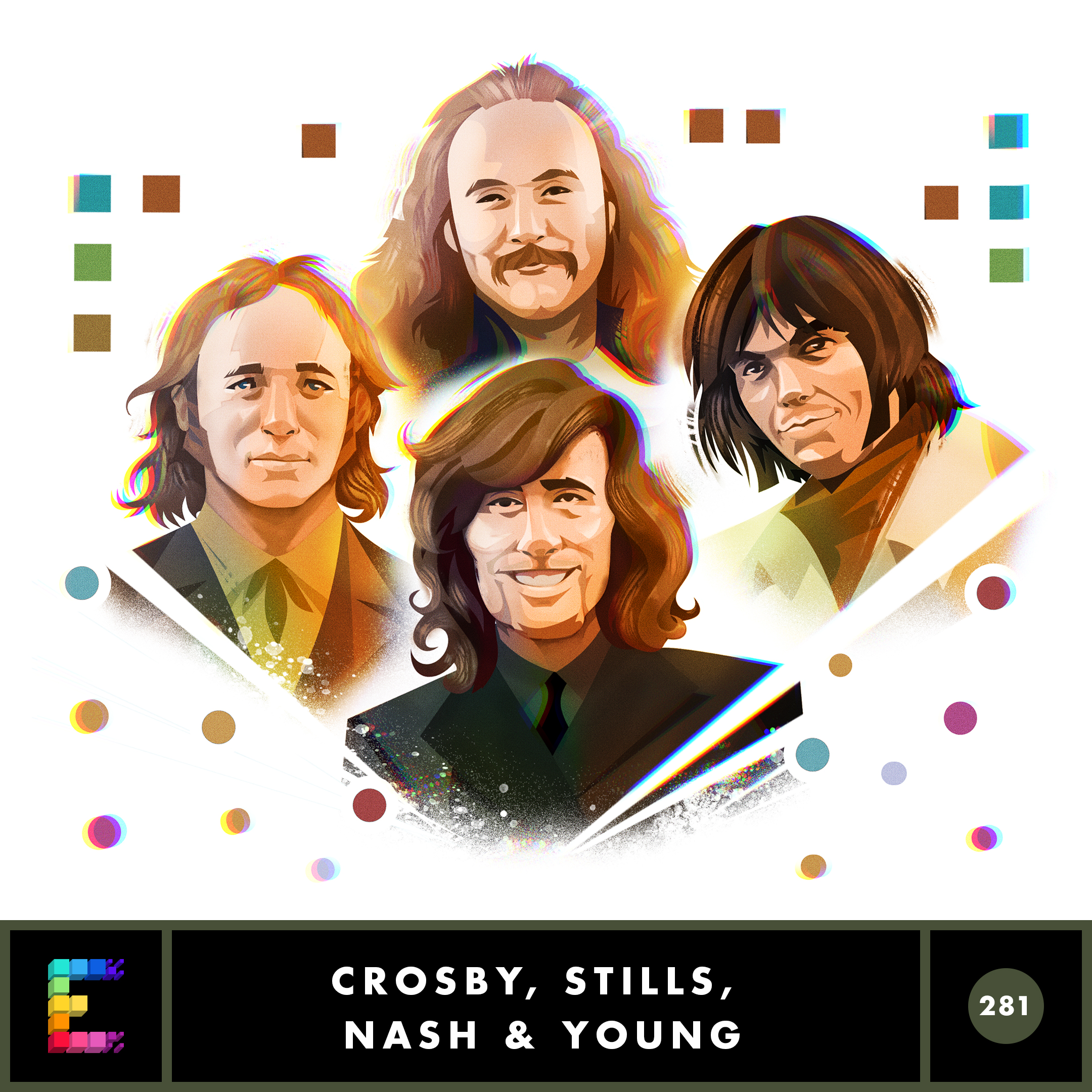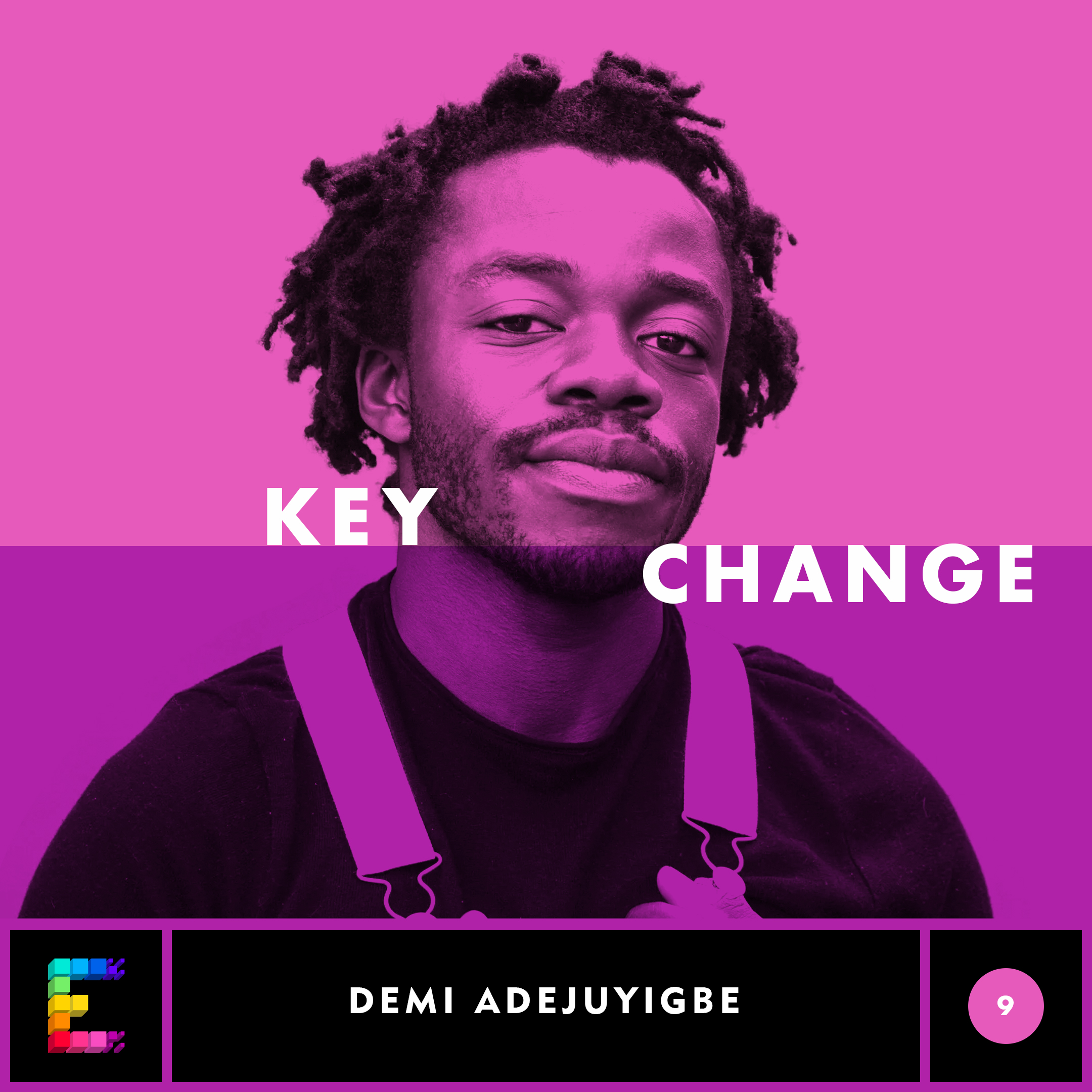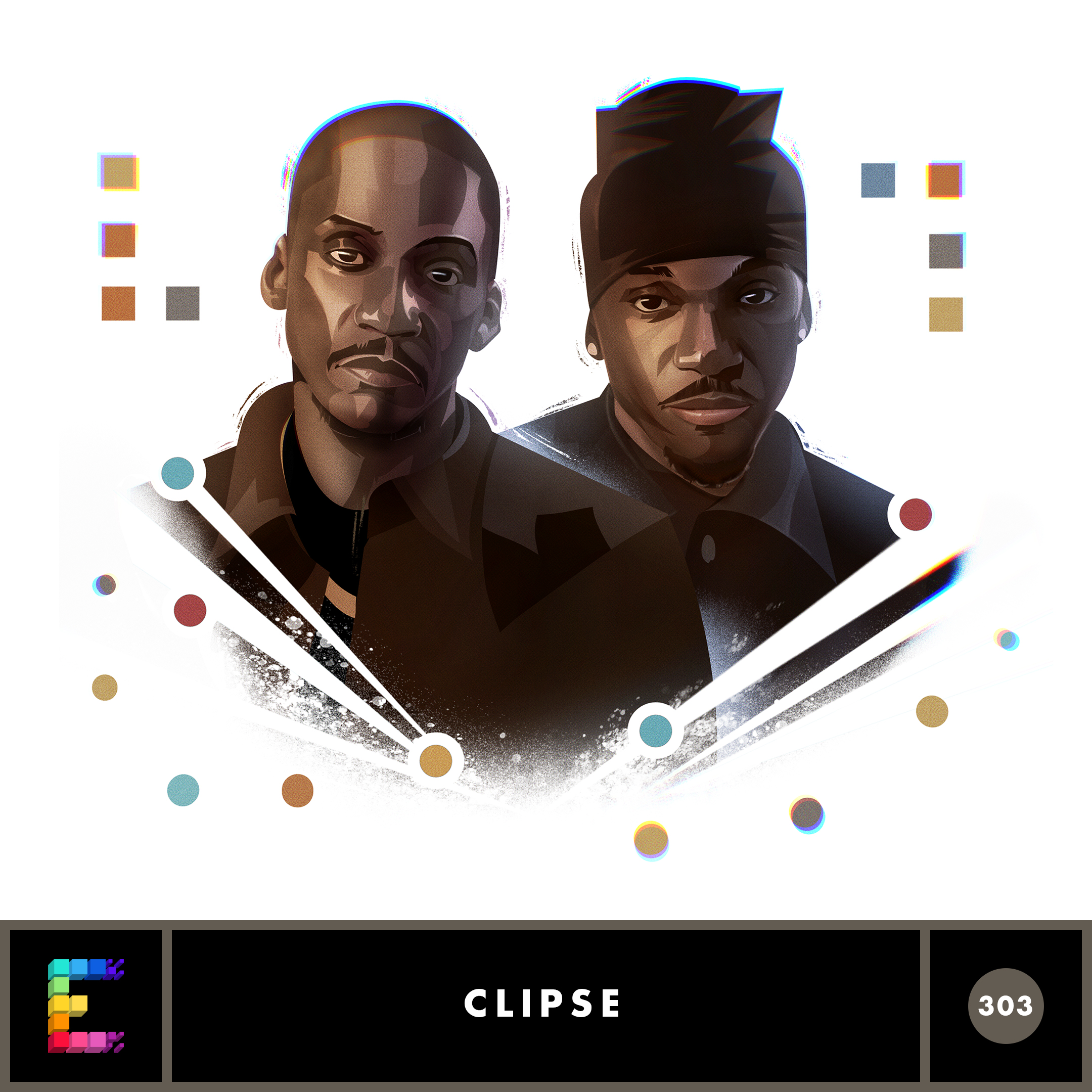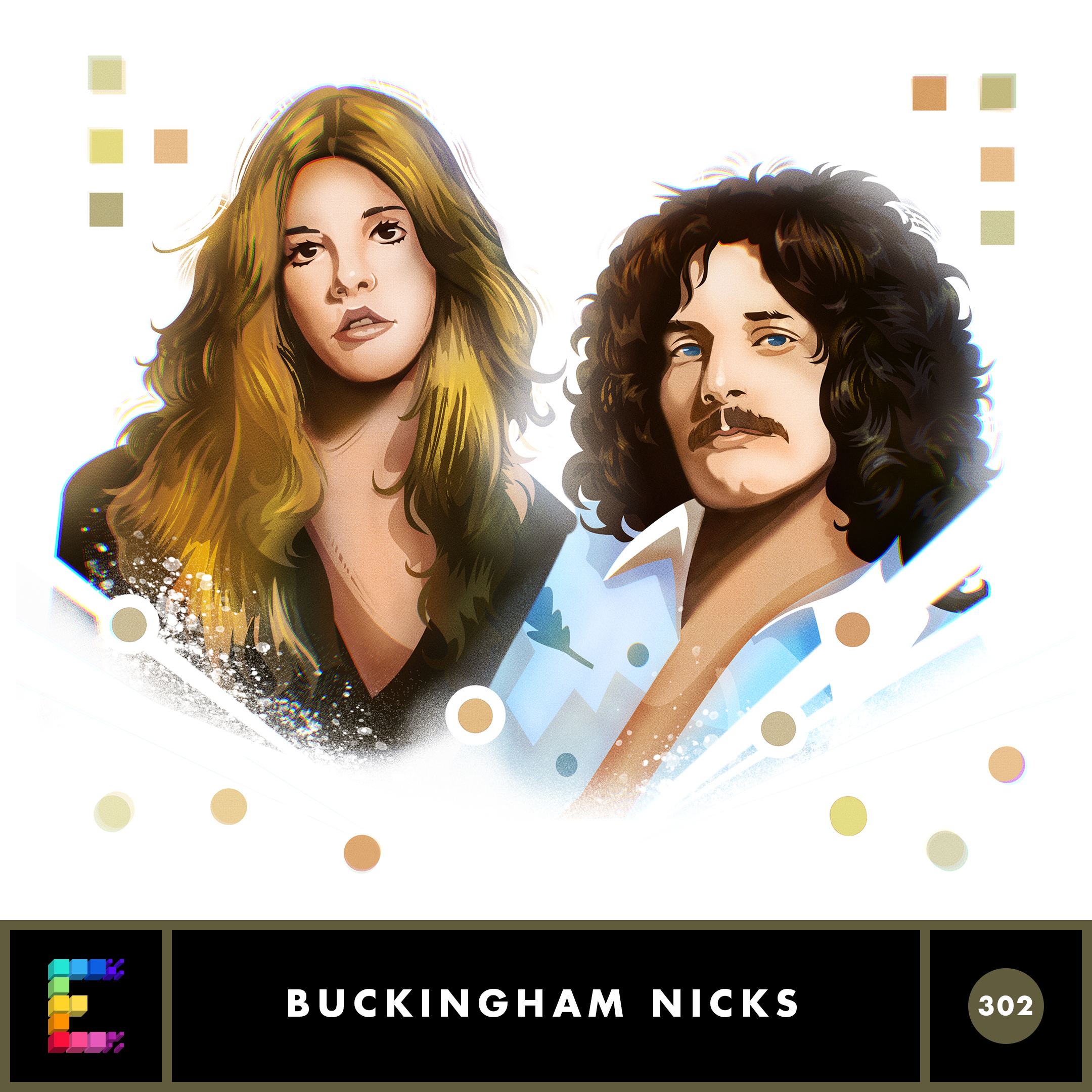Crosby, Stills, Nash & Young - Our House
In 1968, singer and songwriter Graham Nash joined David Crosby and Stephen Stills to form the supergroup Crosby, Stills & Nash. All of them had already been in successful bands: Graham Nash had been in The Hollies; David Crosby was in The Byrds; and Stephen Stills was in Buffalo Springfield. The next year, Neil Young joined them, to make Crosby, Stills, Nash & Young. The four of them released Deja Vu in 1970, and that album was a huge success. It sold over 8 million copies. It includes the song “Our House,” and for this episode, I spoke to Graham Nash about the making of that song, and the relationship that led to the song.
For more, visit songexploder.net/crosby-stills-nash-and-young.
Press play and read along
Transcript
Speaker 1 You're listening to Song Exploder, where musicians take apart their songs and piece by piece tell the story of how they were made. I'm Rishi Kesh Herway.
Speaker 1 This episode is brought to you by the new film Splitsville. It's a comedy about relationships and the messiness that comes with them, and it stars Dakota Johnson and Adria Arhona.
Speaker 1 It premiered at Cannes, where it got rave reviews, and it's distributed by Neon. And for me, that's huge, because I trust Neon the way that I trust my favorite record labels.
Speaker 1 I will definitely check out anything that they put their name on. So I'm looking forward to seeing this.
Speaker 1 Splitsville is already playing now in select theaters, and it'll be playing everywhere on September 5th.
Speaker 1 This episode of Song Exploder is brought to you by Booking.com. Booking.yeah.
Speaker 1 From vacation rentals to hotels across the US, Booking.com has the ideal stay for anyone, even for those who might seem impossible to please.
Speaker 1 Whether you're booking for yourself, your partner, your dad, your group of friends, whoever it is, you can find exactly what you're booking for at booking.com.
Speaker 1 For me, the most hard-to-please member of my household that I book for is my senior dog, Watson. So for one, when I'm looking for places to stay, I always have to have the pet-friendly box checked.
Speaker 1 Watson is 13 years old. He loves to travel, but he's extremely picky about his thread counts.
Speaker 1 And it's always so nice when the hotels don't just allow pets, but they actually make him feel welcome with like a little dog bed and treats. And yeah, he's a very well-kept gentleman.
Speaker 1
So if I can find his perfect stay, you can find yours. Find exactly what you're booking for, booking.com, booking.yeah.
Book today on the site or in the app.
Speaker 1 Could you tell me about the day that you wrote the song? Do you remember it?
Speaker 3 I do indeed.
Speaker 3 I had taken my girlfriend Joni Mitchell to breakfast at a delicate session on Ventura Boulevard in Los Angeles.
Speaker 3 It was at the end of winter, a completely awful day,
Speaker 3
rainy and foggy and very, very cold. After breakfast, Joni and I were walking to where her car was parked and we passed an antique store.
Joni saw a vase that she wanted to buy.
Speaker 3 It was in the back, about 10 inches high.
Speaker 3 some hand-painted flowers around the edge and Joni bought it. We collected the vase and drove to our house in Laurel Canyon.
Speaker 3 And as I went through the front door, I said to John, I said, Hey, Joan, why don't I light a fire and you put some flowers in that vase that you bought today?
Speaker 2 Well,
Speaker 3 that's all I needed.
Speaker 3 While Joni was in the backyard trying to find some flowers that hadn't died yet in winter,
Speaker 3 and I was at her piano,
Speaker 3 I got the first lines and wrote the song.
Speaker 2 I'll light the fire.
Speaker 2 You place the flowers in the vase
Speaker 2 that you bore
Speaker 2 today.
Speaker 1 In 1968, singer and songwriter Graham Nash joined David Crosby and Stephen Stills to form the supergroup Crosby, Stills, and Nash. All of them had already been in successful bands.
Speaker 1 Graham Nash had been in the Hollies, David Crosby was in the Birds, and Stephen Stills was in Buffalo Springfield. And then Neil Young joined them to make Crosby, Stills, Nash, and Young.
Speaker 1 The four of them released Deja Vu in 1970, and that album was a huge success. It sold over 8 million copies.
Speaker 1 It includes the song Our House, and for this episode, I spoke to Graham Nash about the making of that song and the relationship that led to the song.
Speaker 1 How did you and Joni Mitchell first meet?
Speaker 3
We met early in 1967. The Hollies were playing a show in Ottawa in Canada.
Joni had been playing a show at a small folk club and she came to see me.
Speaker 3
And our manager at the time was kind of nattering in my ear. And I said, hey, Robin, I'm not listening to you.
I'm trying to figure out who this beautiful woman is over in the corner there.
Speaker 3 And he said, well, if you would listen to me, I'm telling telling you that that's Joni Mitchell and she wants to meet you. So I walked over to Joan.
Speaker 3 She had on a pale blue silk dress and she had on her knee what looked to me to be a Bible. But it was not a Bible, it was actually a music box.
Speaker 3 And she played it for me and it had one note that was bad.
Speaker 3 And every time it got to that note, she would laugh and we would laugh because, you know, it was a music box. It's supposed to be perfect.
Speaker 3 She was staying at a hotel in Ottawa called the Chateau Laurier we went back to the hotel she played me 18 of the most beautiful songs I'd ever heard in my life
Speaker 3 I was in love completely instantly I believe that she actually liked me also
Speaker 1 but that's the night that I met Joni Mitchell Wow Can you tell me a little bit about the house in question here in Laurel Canyon? When did you first encounter this house?
Speaker 3 December the 10th, 1968.
Speaker 3 And I played with the Hollies on the 8th
Speaker 3 and flew the next day to meet Joan.
Speaker 3 Her house was at 8217 Lookout Mountain. But I pulled into the driveway and I heard other voices and that would kind of piss me off a little because I just wanted to make time with Joan.
Speaker 3 But it was David and Stephen and they were having dinner with Johnny at her house. So I went in and said hello to David.
Speaker 3 I'd known him before because he came to England with the birds and was staying at a very stuffy hotel. And so I called David and I said, you know, come and stay with me at my apartment.
Speaker 3
It's much groovier, you know. So I already knew David.
I didn't know Stephen. The Buffalo Springfield had broken up.
and the birds had thrown David out of the band.
Speaker 3 And so Stephen and David were trying to get like a
Speaker 3 duo thing together, like the Evely brothers, you know.
Speaker 3
And David said, hey, Stephen, play Willie that song. That's my middle name, Graham William Nash.
And my friends call me Willie, even to this day.
Speaker 3 And I always know how old they've been, my friend when they call me Willie.
Speaker 3 So David said, hey, play Willie that song that we were just doing. It was a song called You Don't Have to Cry.
Speaker 3
They played it, got to the end. I said, Stephen, that's an incredible song.
Play it again. They looked at each other, they shrugged, they played it again.
Speaker 3
I said, boy, I'm really good at what I do as a harmony singer. I've learned how David ends a certain phrase.
I've seen Stephen's body language when he's about to finish a line.
Speaker 3
And I'd learned the words. I said, do me a favor.
I'm not crazy. Play it one more time.
They played it one more time. I added my voice and in 45 seconds we had to stop and laugh.
Because
Speaker 3 even though the Buffalo Springfield and the Birds and the Hollies were decent harmony bands, we had never heard this kind of sound.
Speaker 2 Only for you.
Speaker 3
Anyone can sing the same notes as we can. That's no secret.
But you can't sound like David and Stephen and I when we put our voices together and presented as one voice. And
Speaker 3 in that little 45 seconds of laughter and stuff like that, I realized that I'd have to go back to England and change my life.
Speaker 3 You can't present me with a sound like that and not expect me to do something drastic.
Speaker 3 So I knew that I would have to go back to England and leave the Hollies and come to America and follow that sound.
Speaker 2 Now everything
Speaker 2 is easy because of you.
Speaker 1 Okay, I'd like to just play a little something here, and then I'd love to talk about it with you.
Speaker 3 Got it.
Speaker 2 Such a cozy room,
Speaker 2 the windows are illuminated by the
Speaker 2 evening.
Speaker 2 Sunshine
Speaker 2 through them,
Speaker 2 fiery gems for you,
Speaker 2 only for
Speaker 3 That was recorded in Wally Hyder Studio 3 in Los Angeles on Selma and Coenga.
Speaker 1 So in this demo, it's just you solo.
Speaker 3 Yes.
Speaker 3 Normally it was in C, but it was too high for me. And so I changed the key to A.
Speaker 3 And that's me putting it down in A to make sure that that's the right key to actually make the record of.
Speaker 1 I have a crutch of just like pretty much everything I'm writing starts off in C or A minor, you know, because I can, I know where all the fingers are going to go. Do you have that same thing?
Speaker 1 Like, do you tend to start in an all-white keys place?
Speaker 3
Yeah, as simple as possible. Yes.
Do you remember the first time you ever played a minor chord?
Speaker 1 Yeah.
Speaker 3 Quite amazing, isn't it? Yeah.
Speaker 3 Yeah. When you play a minor chord for the first time,
Speaker 3 the whole world opens up
Speaker 3 and you get that feeling.
Speaker 1 Do you remember showing this song to David and Stephen the first time?
Speaker 3
I do. They loved the song.
They thought it was very much a radio song, you know, that they could hear it on the radio. And when we got to the solo,
Speaker 3 stephen said, hey, you know, in a really strange way, that la la la that you're singing on the demo is really, really cute. Let's try and do that.
Speaker 1 When you had written that la la la part, were you intending it to stay that way? Or had you thought of that as a placeholder until that comment?
Speaker 3 I imagined French horns playing, frankly.
Speaker 3 But when Stephen said, that la la la is kind of cute, let's do that.
Speaker 3 I went right along with it, but I initially thought it was going going to be a French horn.
Speaker 1 Did the song change in any other way from when you first wrote it to when you went to show it to your bandmates?
Speaker 3
No, it didn't change at all. It was a very simple record to make because it's an incredibly simple song.
I really enjoy writing simple songs because I want you immediately.
Speaker 3 I don't want you to wait for the fourth verse or the second chorus before you know what I'm talking about. I want you now.
Speaker 1 Can you tell me about the day that you first started recording this song then?
Speaker 3
Yeah. I was in the Wally Haider studio.
I was with Dallas Taylor, who was our drummer
Speaker 3 and Greg Reeves, who was the bass player.
Speaker 3 And we just made the record between ourselves. And then David and Stephen added their vocal parts.
Speaker 1 And did you give specific direction to Dallas and Greg? Did you give them sort of a heads up of like, okay, this is what I'm looking for?
Speaker 1 Like, what was the conversation with them like before you went and tracked it?
Speaker 3 There was very little conversation when I was recording it because I want to play with musicians that want to bring their best to it.
Speaker 3 And because they're great musicians, Dallas Taylor and Greg Reeves are incredible musicians, of course, there's very little talking.
Speaker 3 I played them the demo and then I played it live for them and then we recorded it. I think there's only like three takes of that song.
Speaker 1 So this was pretty fresh after writing it.
Speaker 3
Very much so. Yeah, I like to do that because I can still feel inside of me what it's going to be.
I can still feel that it's going to be a great radio record.
Speaker 3 I can still feel that it's possibly going to be well received by the audience.
Speaker 1 Yeah, there is something that can be lost if you've lived with a song for too long before you go to record it, where it's not surprising you anymore.
Speaker 3
You know, once you've played a song for 20 times, you've lost it. It's gone.
You know, you're just performing it. You're not actually living it.
Speaker 3 And you're living it in those first couple of takes that you do.
Speaker 1 So one of the things that I think is interesting about the song is that there are two piano tracks.
Speaker 1 This track.
Speaker 1 Then also this track.
Speaker 1 Right.
Speaker 1 Could you tell me a little bit about your decision to put two layers of piano in the recording?
Speaker 3 One part that I recorded is doing basically the high part
Speaker 3 and the other is playing the bass part.
Speaker 3 I wanted to fatten up the piano.
Speaker 3
I'm not a great musician. I'm a very simple guitar piano player.
And so I wanted to fatten up the sound of the piano.
Speaker 2 Staring at the fire
Speaker 2 for hours and hours while I listen
Speaker 2 to you
Speaker 2 play
Speaker 2 your love songs all night long
Speaker 2 for me.
Speaker 1
I know you said that the first line, you know, just came right from your experience of that day. I'll light the fire, you place the flowers.
What about the rest of the lyrics?
Speaker 3 Well, completing that verse
Speaker 3 You played your love songs all night long for me, which is what she did in Ottawa. She played me all those beautiful, beautiful songs.
Speaker 3 And then in the second verse, I say, Come to me now and rest your head for just five minutes, everything is done.
Speaker 3 There's an English phrase about everything being done, meaning the dishes have been washed, you know, the carpet had been vacuumed, everything was done.
Speaker 2 Come to me now
Speaker 2 and rest your head for just five minutes. Everything
Speaker 2 is done.
Speaker 3 And then of course the chorus.
Speaker 3
Our house was a very, very fine house. And she had two cats, Calico and Hunter.
One was a calico, red and black. And Hunter was purely black.
And yeah, there were two cats in the yard.
Speaker 2 Our
Speaker 2 house is a very, very, very fine house with two cats in the yard.
Speaker 2 Life used to be so hard.
Speaker 2 Now everything
Speaker 2 is easy because of you.
Speaker 1 Could I also ask you about the harpsichord? How did you decide to include harpsichord in the track?
Speaker 3 We use the harpsichord because there's no guitars on there.
Speaker 3
There are no guitars on this track. It's just piano.
And so, in trying to make it just piano, I wanted a real
Speaker 3 big
Speaker 3 sound.
Speaker 1 My conversation with Graham Nash continues after this.
Speaker 1 Song Exploder is sponsored by Quince, which is a great place to find clothes for the fall. Here in LA, it's pretty hot during the day, but then it always drops to the low 60s at night, even in August.
Speaker 1 So when I want to dress for the fall, even in the summer, I just wait for the evening.
Speaker 1 And then I put on this sweater that I got from Quince that has a sort of high collar with four buttons going up the neck. It's made from Mongolian cashmere, and I really love it.
Speaker 1 And I know I'm going to be wearing it through the fall here in LA and when I'm traveling other places. Quince partners directly with Ethical Factories, and they only sell direct to customers.
Speaker 1 So you get top-tier fabrics and craftsmanship at half the price of similar brands. So keep it classic and cool this fall with long-lasting staples from Quince.
Speaker 1 Go to quince.com/slash song exploder for free shipping on your order and 365 day returns. That's quince.com slash song exploder for free shipping and 365 day returns.
Speaker 1 Again, it's quince.com slash song exploder.
Speaker 4
This show is supported by Odo. When you buy business software from lots of vendors, the costs add up and it gets complicated and confusing.
ODU solves this.
Speaker 4 It's a single company that sells a suite of enterprise apps that handles everything from accounting to inventory to sales. Odoo is all connected on a single platform in a simple and affordable way.
Speaker 4
You can save money without missing out on the features you need. Check out Odo at odoo.com.
That's odoo.com.
Speaker 4 Support for this podcast and the following message come from Sutter Health.
Speaker 4 Whether it's prenatal care or post-menopausal guidance, Sutter's team of OBGYNs, doctors, and nurses are dedicated to building long-term relationships for lifelong care.
Speaker 4 With personalized care plans for every patient, it's their commitment to supporting every woman at every stage of her life. Learn more at Sutterhealth.org.
Speaker 1 How did it end up working out that you went into the studio before David and Stephen showed up? Was that always the plan?
Speaker 3
It just happened that way. You know, people sleep in late.
Normally we would be in the studio until three or four in the morning. And I just happened to be awake, and so was Dallas, and so was Greg.
Speaker 3 So we just went in the studio at two o'clock, you know, and they just were late to the studio. And so me and Dallas and Greg just cut the record.
Speaker 3 We knew that once we'd done it, that we had got the essence of the song down.
Speaker 3 And we knew that David and Stephen, when they came in to listen to it, they would love it and they would know exactly what to do as overdubes.
Speaker 1 This song doesn't have Neil Young on it.
Speaker 3 Neil is not on our house because what would Neil do? He's Neil Young, for God's sake, an incredibly great guitar player, and I think he's a very decent singer.
Speaker 3 But there was no room for Neil and Neil knew that. Neil listened to it and he goes, it's done.
Speaker 3 Why try and screw with it?
Speaker 1 I'd love to listen to the vocal arrangement now because have these three tracks of your voice.
Speaker 2 Such a cozy room. Such a cozy room.
Speaker 1 Two tracks of David.
Speaker 2 Such a cozy room.
Speaker 1 And two tracks of Stephen.
Speaker 2 Such a cozy room.
Speaker 3 We wanted to make sure that it sounded fabulous. And that's how we did it.
Speaker 2 Such a cozy room. Such a cozy windows are illuminated
Speaker 2 by the
Speaker 2 evening.
Speaker 2 Sunshine through them.
Speaker 2 Fiery gems for you.
Speaker 2 Only for you.
Speaker 1 So, one thing I wanted to ask you about is this moment where you sort of split off into this sort of counterpoint thing. A
Speaker 2 house is a very, very, very fine house.
Speaker 3 So, what happened is basically it was a mistake.
Speaker 1 Really?
Speaker 3 Oh, yeah. It was David and Stephen just drifting off into a different part.
Speaker 3 But you see, that's what I like about first and second takes. You know, sometimes mistakes can happen that really, really are not mistakes.
Speaker 3
And so once we did that, we made it a part of the vocal blend. But it was actually started out as a mistake.
It's a very, very, very, very, very fine house.
Speaker 1 What was it like just now for you to hear that vocal track? Do you still have any kind of emotional reaction at this point to hearing this song or to hearing something like that in isolation?
Speaker 3 I must confess that when you played that, my mind was on David Crosby. You know, he passed away about a year and a half ago, and that's what I was listening to.
Speaker 3 I was listening to David's part and realizing how much I loved him and how much I missed him.
Speaker 2 Our
Speaker 2 house
Speaker 2 is a very, very, very, very, very fine house with two cats in the yard.
Speaker 2 Life used to be so hard.
Speaker 2 Now everything
Speaker 2 is easy because of you.
Speaker 2 And
Speaker 2 la,
Speaker 2 la la la la
Speaker 2 la la la.
Speaker 1 When did you first realize that the song was a hit?
Speaker 3 The moment I recorded it.
Speaker 3 We're good musicians. You know, we know what's good and what's not.
Speaker 1 You don't need the external validation of the audience to tell you that it was a hit.
Speaker 2 Nope.
Speaker 1 Okay, there's just one more thing that I wanted to play for you.
Speaker 1 Our
Speaker 2 house is a very, very, very fine house
Speaker 2 with two cats in the yard.
Speaker 2 Life used to be so hard.
Speaker 2 Now everything is easy because of you.
Speaker 2 And
Speaker 2 la
Speaker 2 la la la la
Speaker 3 That's the time that we were in Philadelphia at the music hall there,
Speaker 3
and Johnny was with me. And I started to, at sound check, play our house, and she joined me on vocal and piano.
That's the only time it ever happened.
Speaker 1 Really? That's the only time it ever happened.
Speaker 2 Everything
Speaker 2 is done.
Speaker 2 Shit, go to cozy room.
Speaker 2 I just love that part.
Speaker 3 Yep, that's me and Joni.
Speaker 3 And
Speaker 3 I
Speaker 3 light the file,
Speaker 3 and you place the flowers in the vase that you bought
Speaker 3 today.
Speaker 1 Why were you recording this at Soundcheck?
Speaker 3 I wasn't, but it was our front-of-house sound guy that was.
Speaker 3
I didn't ask him to record it. I was just making sure that I could hear the piano.
It was done completely spontaneously.
Speaker 1 Hearing that version again, what does that evoke for you?
Speaker 3 That version of Joni and I playing it with four hands on the piano. This was a very special moment between Joni and I.
Speaker 1 Can I ask you, how is it that you have such exquisite detail in your memories?
Speaker 1 I'm so impressed that you know the date that you left the band, that you remember the hand-painted flowers around the bottom of the vase.
Speaker 1 You know, I interview people for this show all the time, and there are people who are talking about a song that they wrote the year before, and they can't remember anything.
Speaker 3 I have a good memory. I'm 82 now.
Speaker 3 It was a very important time in my life. I mean, to live and love Joni Mitchell was incredibly special to me and as a musician of course I'm on the road a lot.
Speaker 3 To be able to write a song about my actual home where I lived was very comforting for me and it was easy to remember because you know that's when I first put my voice together with David and Stevens in Joni's living room with Joni as the only witness to the beginning of Crosby Stills and Nash.
Speaker 1 And now, here's Our House by Crosby Stills Nash and Young in its entirety.
Speaker 1 I'll light the fire.
Speaker 2 You place the flowers in the vase
Speaker 2 that you bought
Speaker 2 today.
Speaker 2 Staring at the fire
Speaker 2 for hours and hours while I listen
Speaker 2 to you
Speaker 2 play
Speaker 2 your love songs all night long.
Speaker 2 Call me
Speaker 2 Omnipot me
Speaker 2 Come to me now
Speaker 2 and rest your head for just five minutes.
Speaker 2 Everything
Speaker 2 is done.
Speaker 2 Such a cozy room, such a cozy room. The windows are illuminated
Speaker 2 by the evening
Speaker 2 sunshine through them.
Speaker 2 Fiery gems for you,
Speaker 2 only for you
Speaker 2 A
Speaker 2 house is a very, very, very fine house
Speaker 2 with two cats in the yard.
Speaker 2 Life used to be so hard.
Speaker 2 Now everything
Speaker 2 is easy because of you.
Speaker 2 And
Speaker 2 now
Speaker 2 la la,
Speaker 2 la la la la la la la la la la la la la la la
Speaker 2 la la la la la la la la la la la la la la la la la
Speaker 2 la la la la la la la la la la la la la la
Speaker 2 la la la la la la la
Speaker 2 house
Speaker 2 is a very very very fine house
Speaker 2 with two cats in the yard.
Speaker 2 Life used to be so hard.
Speaker 2 Now everything
Speaker 2 is easy because of you.
Speaker 2 And
Speaker 2 now
Speaker 2 I'll light the fire
Speaker 2 while you place the flowers in the vase
Speaker 2 that you bought
Speaker 2 today.
Speaker 1 To learn more, visit songexploder.net. You'll find links to buy or stream our house.
Speaker 1 This episode was produced by Craig Ely, Theo Balcombe, Kathleen Smith, Mary Dolan, and myself. Our production assistant is Tiger Biscuit.
Speaker 1 The episode artwork is by Carlos Lerma, and I made the show's music and logo.
Speaker 1 Song Exploder is a proud member of Radiotopia from PRX, a network of independent, listener-supported, artist-owned podcasts. You can learn more about our shows at radiotopia.fm.
Speaker 1 You can sign up for my newsletter on the Song Exploder website.
Speaker 1 You can also follow me and Song Exploder on Instagram, and you can get a Song Exploder t-shirt at songexploder.net/slash shirt. I'm Rishi Keishirway.
Speaker 1 Thanks for listening.
Speaker 1 Radiotopia
Speaker 1 from PRX.





